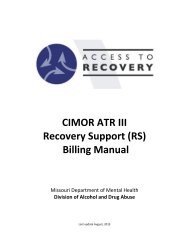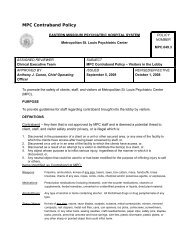Missouri Department of Mental Health
Missouri Department of Mental Health
Missouri Department of Mental Health
Create successful ePaper yourself
Turn your PDF publications into a flip-book with our unique Google optimized e-Paper software.
CPS Facts<br />
MENTAL HEALTH<br />
Most people travel through life without giving mental health a second thought. While making annual visits<br />
to a physician's <strong>of</strong>fice for a check-up or to a dentist to maintain healthy teeth is routine, what can be done to<br />
maintain good mental health?<br />
<strong>Mental</strong> health depends on several factors, some <strong>of</strong> them beyond a person’s control. But there is a lot that can<br />
be done to remain mentally healthy.<br />
qSelf-esteem.<br />
How people look at themselves has a lot to do with how they think, feel, and act. If a person’s self<br />
image is positive, then he or she feels confident in the ability to achieve set goals and to deal with<br />
life’s occasional problems. There is satisfaction in achieving those goals, which helps to improve<br />
performance and to form healthy and lasting relationships with other people.<br />
Building positive self-esteem cannot be accomplished overnight, but can begin immediately.<br />
• Be honest by recognizing both strengths and faults.<br />
• Be willing to try to improve by believing that faults can be overcome and strengths can<br />
be developed.<br />
• Strive to make the most <strong>of</strong> abilities while avoiding the pressure brought on by not recognizing<br />
limitations.<br />
• Set goals. Avoid being compared with others.<br />
qStress.<br />
Some stress in life is not only natural, but necessary. It helps the mind and body prepare for and<br />
meet challenges. Stress increases the heart rate and breathing, rushes adrenalin to the muscles,<br />
and enhances mental alertness. But too much stress can be harmful, especially if it remains after<br />
the challenge has subsided. It can lead to ulcers, heart disease, depression, and anxiety. Remaining<br />
mentally healthy requires learning to cope with stress.<br />
• Learn to avoid unnecessary stress by avoiding situations that cause it.<br />
• Organize available time to do what needs to be done.<br />
• Talk with other people and don’t keep problems and anger bottled up inside.<br />
• Learn to relax.<br />
qPhysical health.<br />
The old saying, a healthy mind depends on a healthy body, is true. Feeling good about oneself is<br />
easier when physically fit.<br />
• Don’t abuse alcohol or other drugs.<br />
• Stop smoking.<br />
• Exercise regularly.<br />
• Eat healthy foods.<br />
• Get plenty <strong>of</strong> rest.<br />
• Control weight.<br />
qGrowing older.<br />
Older people are more susceptible to situations that can lead to mental illness. These include loss<br />
<strong>of</strong> friends or loved ones, loss <strong>of</strong> income or livelihood and the independence that went with it, and<br />
loss <strong>of</strong> physical health and dignity. Some <strong>of</strong> these losses are unavoidable, but there are things that<br />
can be done to remain mentally healthy in the later years.<br />
• Set new goals.<br />
• Adapt to changes in your lifestyle, in society, and among friends.<br />
• Find something enjoyable to do and do it.<br />
• Don’t neglect physical health.<br />
• Make the necessary changes.<br />
• Be realistic and acknowledge that everyone grows old.
qIf mental illness occurs.<br />
Despite the best efforts to prevent mental illness, it still occurs. The causes may be physical<br />
changes in the brain, genetic factors present since birth, or outside factors beyond anyone’s control.<br />
Fortunately, most mental illnesses can be treated successfully and the person returned to a<br />
full and productive life.<br />
Learn about mental illness and its warning signs. Prompt treatment can avert more serious problems.<br />
qWhat else to do.<br />
People with a mental illness <strong>of</strong>ten face the stigma attached by society to mental illness. This<br />
stigma causes discrimination against people with a mental illness in employment, housing,<br />
health care, and an ability to buy health insurance. By learning more about mental illness and the<br />
effectiveness <strong>of</strong> treatment, this discrimination can end, removing the stigma that acts as a barrier<br />
to successful treatment.<br />
For more information,<br />
contact the nearest community<br />
mental health<br />
center or the<br />
<strong>Missouri</strong> <strong>Department</strong> <strong>of</strong><br />
<strong>Mental</strong> <strong>Health</strong>,<br />
Division <strong>of</strong><br />
Comprehensive<br />
Psychiatric Services<br />
P.O. Box 687<br />
1706 East Elm<br />
Jefferson City, MO 65101<br />
573-751-8017<br />
dmh.mo.gov<br />
Sponsored by <strong>Missouri</strong> Advisory Council for Comprehensive Psychiatric Services.

















